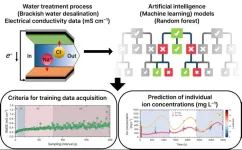(Press-News.org) A study based on clinical trial data found higher risks of stroke, heart attack, and hospital admission for heart failure in older cancer survivors. In the analysis published by Wiley online in CANCER, a peer-reviewed journal of the American Cancer Society, chemotherapy was also linked to elevated rates of these conditions.
Although advances in treatment have led to decreased cancer mortality over the past decade, the growing numbers of cancer survivors may experience long-term effects of cancer and anticancer therapies. For example, the heart may be especially vulnerable to inflammation triggered by cancer and toxic effects from chemotherapy and radiation.
To investigate cardiovascular disease incidence in older cancer survivors and the impact of specific cancer treatments on heart health, a team led by Monash University’s Suzanne Orchard, PhD analyzed information from the ASPirin in Reducing Events in the Elderly (ASPREE) trial, which included adults aged 70 years and older who were living in Australia and the United States.
Other studies have observed cerebrovascular diseases such as stroke and heart attacks following cancer treatment, but to the authors’ knowledge, this is the first that has explored the effects of individual treatment modalities on different cancer types, along with the impact of aspirin on rates of cerebrovascular diseases.
Of the 15,454 participants, 1,392 developed cancer over an average follow-up of 4.6 years. When the researchers assessed which participants experienced a cardiovascular disease event including stroke, heart attack, or hospital admission for heart failure, they found that the rate was twice as high in those who developed cancer compared with those who were cancer-free, at 20.8 versus 10.3 events per 1,000 person-years. (This means there would be an average of 20.8 and 10.3 cardiovascular disease events among 1,000 people over one year in the respective groups.) This elevated risk—which was seen across the different cardiovascular outcomes—remained even after accounting for traditional cardiovascular disease risk factors.
The incidence of cardiovascular disease events was greatest in patients with metastatic, blood, and lung cancers. Also, chemotherapy was associated with a 2-times higher risk of cardiovascular disease events.
Analyses were inconclusive regarding other systemic therapies such as hormonal therapy, targeted therapy, immunotherapy, and radiation therapy—although thoracic radiation is known to confer an elevated risk. Aspirin (the clinical trial intervention in the trial) did not impact cardiovascular disease incidence.
Dr. Orchard stressed the importance of early screening and preventive measures as early as possible and the need for continued research to further protect cancer survivors’ cardiovascular health.
“Our research contributes to the growing body of work indicating that cancer- and treatment-related cardiovascular disease is a very real risk in cancer survivors,” she said. “Cardiovascular disease can have a significant impact on both quality of life and survival for patients with cancer. Fortunately, with early screening and preventative measures, some of the cancer-related risks can be mitigated.”
Additional information
NOTE: The information contained in this release is protected by copyright. Please include journal attribution in all coverage. A free abstract of this article will be available via the CANCER Newsroom upon online publication. For more information or to obtain a PDF of any study, please contact: Sara Henning-Stout, newsroom@wiley.com
Full Citation:
“Cardiovascular disease and stroke following cancer and cancer treatment in older adults.” Jaidyn Muhandiramge, John R. Zalcberg, Erica T. Warner, Galina Polekhina, Peter Gibbs, G J. van Londen, Wendy B. Bernstein, Finlay Macrae, Andrew Haydon, Jeanne Tie, Jeremy L. Millar, Victoria J. Mar, Lucy Gately, Andrew Tonkin, Leslie Ford, Asad Umar, Andrew T. Chan, Robyn L. Woods, and Suzanne G. Orchard. CANCER; Published Online: September 23, 2024 (DOI: 10.1002/cncr.35503).
URL Upon Publication: http://doi.wiley.com/10.1002/cncr.35503
Author Contact: Cheryl Critchley of Monash University Marketing, Admissions, and Communications, at cheryl.critchley@monash.edu or +61 (0) 477 571 442.
About the Journal
CANCER is a peer-reviewed publication of the American Cancer Society integrating scientific information from worldwide sources for all oncologic specialties. The objective of CANCER is to provide an interdisciplinary forum for the exchange of information among oncologic disciplines concerned with the etiology, course, and treatment of human cancer. CANCER is published on behalf of the American Cancer Society by Wiley and can be accessed online. Follow CANCER on X @JournalCancer and Instagram @ACSJournalCancer, and stay up to date with the American Cancer Society Journals on LinkedIn.
About Wiley
Wiley is a knowledge company and a global leader in research, publishing, and knowledge solutions. Dedicated to the creation and application of knowledge, Wiley serves the world’s researchers, learners, innovators, and leaders, helping them achieve their goals and solve the world's most important challenges. For more than two centuries, Wiley has been delivering on its timeless mission to unlock human potential. Visit us at Wiley.com. Follow us on Facebook, X, LinkedIn and Instagram.
END
Do cancer and cancer-related treatments increase cardiovascular disease risk in older cancer survivors?
2024-09-23
ELSE PRESS RELEASES FROM THIS DATE:
Artificial intelligence helps produce clean water
2024-09-23
About 2.2 billion people, more than a quarter of the world's population, lack access to safe, managed drinking water, and about half of the world's population experiences severe water scarcity at some point during the year. To overcome these shortages, huge socioeconomic costs are being spent on sewer irrigation and alternative water sources such as rainwater reuse and seawater desalination. Furthermore, these centralized water distribution systems have the disadvantage of not being able to respond immediately to changes in water demand. Therefore, there is a growing interest in decentralized water production technologies, which are electrochemical-based ...
Drug overdose more likely in patients who leave hospital against medical advice
2024-09-23
People who initiate a premature or “before medically advised” (BMA) hospital discharge have a 10-fold increase in the risk of drug overdose in the following month, according to new research in CMAJ (Canadian Medical Association Journal) https://www.cmaj.ca/lookup/doi/10.1503/cmaj.240364.
Patients leave hospital prematurely for a range of reasons, including improperly treated pain, cravings, stress that accentuates psychiatric issues, conflicts with hospital staff, and restrictions on movement or visitors. Hospital patients who initiate a BMA discharge are up to 3 times ...
Mark your calendars: Insect science takes center stage in Phoenix, November 10–13
2024-09-23
What: Entomology 2024, the annual meeting of the Entomological Society of America
Where: Phoenix Convention Center, Phoenix, Arizona
When: November 10–13, 2024
Who: 3,500+ insect scientists and entomology experts
For four days in November, Phoenix, Arizona, will be the entomology capital of the world at Entomology 2024.
As the planet’s largest yearly gathering of insect scientists, the annual meeting of the Entomological Society of America will convene more than 3,500 experts, students, and practitioners to share and ...
Study shows alcohol-dependent men and women have different biochemistries, so may need different treatments
2024-09-22
MILAN — A new study reveals hormonal and biochemical factors that affect alcohol dependence (also known as Alcohol Use Disorder), suggesting that men and women with alcohol problems may benefit from different treatments.
Scientists have known that men and women have different risks related to alcohol misuse and related problems and that alcohol treatments may need to be tailored differently to men and women. However, the biological mechanisms underlying those differences are not well understood.
"This is the first large study to confirm that some of the variability in Alcohol Use Disorder (AUD) and related ...
Researchers find that Antidepressants may improve brain function
2024-09-22
Researchers have found that SSRI (Selective Serotonin Reuptake Inhibitors) antidepressants have the potential to improve certain cognitive functions, such as verbal memory. They measured brain function in patients before and after taking the SSRI escitalopram and correlated this to a drop in the level of one of the serotonin receptors in the brain and to cognitive improvements during treatment. This work is presented for the first time at the ECNP Conference in Milan, after recent publication in the journal Biological Psychiatry.
Serotonin is often described as a ‘feel good’ chemical, and higher levels of serotonin circulating in the brain contribute to a sense of well-being, ...
Aviation can achieve Net-Zero by 2050 if immediate action is taken, says University of Cambridge report
2024-09-22
Cambridge University has today released a groundbreaking report outlining a five-year roadmap to help the aviation sector achieve net-zero climate impact by 2050.
Despite ambitious pledges from governments and industry, the aviation sector remains significantly off course in its efforts to achieve net-zero emissions by 2050. The report, titled “Five Years to Chart a New Future for Aviation,” outlines four 2030 Sustainable Aviation Goals—specific, actionable steps that must be initiated immediately and completed within five years if the aviation sector is to be on track to achieve net-zero by 2050.
The 2030 Goals outlined in the report are:
Accelerating the deployment ...
Study shows psychedelic drug psilocybin gives comparable long-term antidepressant effects to standard antidepressants, but may offer additional benefits
2024-09-22
A direct comparison between the experimental psychedelic drug psilocybin and a standard SSRI antidepressant shows similar improvement of depressive symptoms, but that psilocybin offers additional longer-term benefits.
The comparison, between psilocybin (the active ingredient in “magic mushrooms”) and the SSRI escitalopram gave similar long-term improvements in depressive symptoms over a 6-month period, however patients taking psilocybin also reported better psychosocial functioning including experiencing a greater sense of meaning ...
Study finds symptoms of depression during pregnancy linked to specific brain activity: scientists hope to develop test for “baby blues” risk
2024-09-21
Milan, Italy: Around 80% of women suffer from “baby blues” after the birth of their child. Normally this is a brief period of feeling down which disappears in a few days. But around 1 woman in 7 develops postpartum depression; this is a more serious depression which can affect how mothers bond with their baby and can have long-term consequences. These women seem unable to regulate the negative emotions which can follow giving birth.
Now a group of European Reesearchers have found that in healthy pregnant women activity in a specific area deep in the brain is linked to regulation of negative ...
Sexual health symptoms may correlate with poor adherence to adjuvant endocrine therapy in Black women with breast cancer
2024-09-21
LOS ANGELES – Among patients with early-stage breast cancer treated with adjuvant endocrine therapy (AET), symptoms related to sexual health were associated with decreased adherence to treatment in Black women, according to results presented at the 17th AACR Conference on the Science of Cancer Health Disparities in Racial/Ethnic Minorities and the Medically Underserved, held September 21-24, 2024.
Patients with hormone receptor-positive breast cancer are commonly given endocrine therapy—treatments that block estrogen signaling in the breast—after receiving surgery, radiation, or chemotherapy. The recommended regimen for AET ...
Black patients with triple-negative breast cancer may be less likely to receive immunotherapy than white patients
2024-09-21
LOS ANGELES – In recent years, Black patients with triple-negative breast cancer (TNBC) received immunotherapy at significantly lower rates than white patients, according to results presented at the 17th AACR Conference on the Science of Cancer Health Disparities in Racial/Ethnic Minorities and the Medically Underserved, held September 21-24, 2024.
Black women are disproportionately affected by TNBC, an aggressive subtype of breast cancer defined by the lack of three cell surface receptors. The absence of these receptors means that patients with TNBC are ineligible for many of the molecularly targeted therapies used to treat other breast cancer subtypes, explained ...


